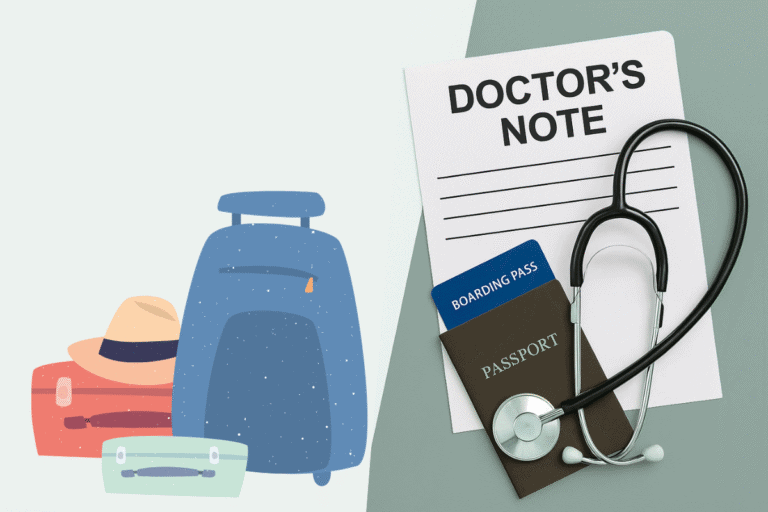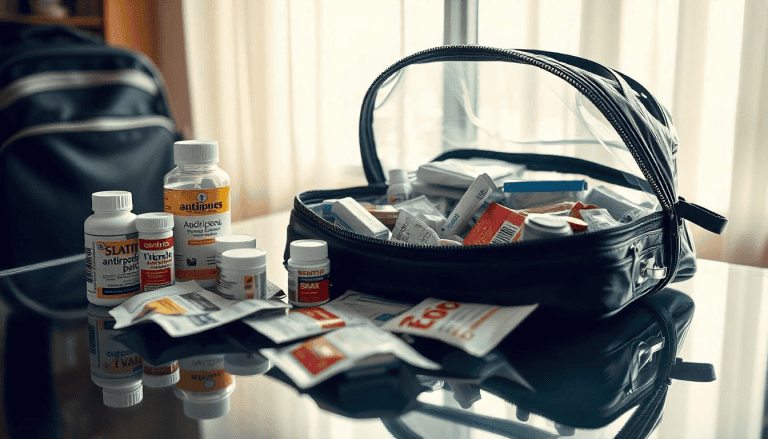How to Pack Powder Supplements for Travel

I learned firsthand how tricky it can be to travel with powder supplements. Many years ago, on a trip to Spain, I packed a huge jar of protein powder in my carry-on without a second thought. At airport security, a TSA officer pulled my bag aside, swabbed the jar, ran a test, and asked a series of questions that made me feel like I was smuggling cocaine.
Though I eventually got it back, the delay was enough to make me rethink how I packed powders for travel.
Frankly, packing powdered supplements for air travel seems simple—until you realize that TSA enforces specific rules, and some energy powders closely resemble restricted substances. If you’re carrying protein powder, greens, or herbal blends, knowing how to pack powder supplements for travel can help you avoid extra screening, delays, or even confiscation at security.
The good news? You can bring powdered supplements on a plane if you pack them correctly. This guide covers TSA regulations, international customs rules, and best packing strategies to help you travel smoothly—without the stress of unexpected security issues. If you’re packing prescription meds, please read our comprehensive guide to Flying with Medication.
1. TSA Rules for Powder Supplements on Domestic Flights
If you’re flying within the U.S., the Transportation Security Administration (TSA) allows powdered supplements in both carry-on and checked luggage. However, any powder exceeding 12 ounces (350mL) in a carry-on must be placed in a separate bin for additional screening.
While smaller amounts generally pass through security without issue, TSA officers can still inspect or test powders if they appear suspicious. Keeping your supplements in original packaging with clear labels can help prevent unnecessary questioning. If you’re carrying a large quantity, consider packing it in your checked bag to avoid delays at security.
1.1 Understanding TSA’s Powder Rule
TSA regulations for powders are relatively straightforward:
- Powders under 12 ounces (350mL) can stay in your carry-on but may still be subject to testing.
- Powders over 12 ounces must be placed in a separate bin for screening.
- No restrictions apply to checked luggage, but proper packing is essential to prevent spills.
Although TSA doesn’t prohibit large quantities of powder, the more you carry, the more likely you are to undergo additional screening.
KEEN TIP: Keep powdered supplements in their original containers or resealable bags with labels. TSA officers are less likely to question clearly labeled products.
1.2 Carry-On vs. Checked Luggage: Where Should You Pack Powders?

Deciding whether to pack powdered supplements in your carry-on or checked luggage depends on your needs.
- Carry-on luggage keeps your supplements easily accessible and prevents damage from rough baggage handling. This is ideal if you plan to use them during your flight. However, anything over 12 ounces may require extra screening, leading to potential delays.
- Checked luggage allows you to pack larger amounts without TSA restrictions, making it a better option for bulkier powders like protein or meal replacements. The downside? Spills are more likely if containers aren’t properly sealed.
KEEN TIP: If you’re traveling with more than 12 ounces of powder but still want it in your carry-on, split it into smaller portions in clearly labeled bags. This minimizes the chances of it being flagged for additional screening. Also be sure to read our guide: Can TSA Take Your Medication? for the steps to take in case you run into issues.
1.3 How to Pack Powder Supplements for TSA Screening
No one enjoys being held up at security, so a little preparation goes a long way. To make TSA screening as smooth as possible:
- Store powders in resealable plastic bags or travel-sized containers to minimize spills.
- Keep them separate from liquids and electronics so they’re easy to access during screening.
- Single-serve packets are a TSA-friendly alternative—officers rarely question them.
- If carrying an unusual-looking powder (greens, herbal blends, etc.), bring a small printed ingredient list or the original label to clarify its contents.
KEEN TIP: If you need quick access to powders mid-flight, pack them near the top of your carry-on. This makes it easy to remove them during screening if needed.
2. Traveling with Powder Supplements on International Flights
Flying internationally with powdered supplements requires extra care. Unlike TSA, which enforces uniform rules across the U.S., every country has its own customs regulations for powders. Some nations limit the amount of powdered supplements you can bring, while others require you to declare them upon arrival.
For example, Australia has strict dietary supplement regulations, and even a sealed container of protein powder could be confiscated if not properly labeled. A friend of mine learned this the hard way when his expensive tub of protein powder was taken at customs simply because the label wasn’t clear enough.
2.1 What to Know About International Customs Rules for Powders
International travel introduces additional challenges when flying with powdered supplements. Unlike pills or liquids, powders often raise concerns due to their texture and resemblance to other substances. Before you fly, research the following:
- Are powder supplements classified as controlled substances? Some countries strictly regulate herbal powders, protein blends, or specific vitamins.
- Do you need to declare them at customs? Even small amounts may require documentation.
- Are there quantity limits? Certain nations only allow powdered supplements in restricted amounts without a prescription.
A simple mistake—like failing to declare powders in a country that requires it—could result in confiscation or fines. Read more in our guide Can Customs Take Your Medication? if you encounter any problems.
KEEN TIP: Before flying, check the U.S. embassy website for your destination to find updated regulations on bringing supplements into the country.
2.2 Best Ways to Pack Powder Supplements for International Travel

To avoid delays and potential confiscation, pack powders carefully and follow these best practices:
- Keep them in original packaging to verify they are commercially produced supplements.
- Label homemade blends clearly, using airtight containers or resealable bags.
- Bring an ingredient list or a manufacturer printout to explain the contents if questioned.
- Pack smaller portions instead of one large container to make inspections easier.
If you’re carrying medicinal powders or large amounts, a doctor’s note or prescription can help validate your need for them at customs.
KEEN TIP: When in doubt, pack only what you need and check import restrictions before departure.
3. Special Considerations for Different Types of Powdered Supplements
Not all powdered supplements are treated the same at airport security. While TSA and customs generally allow them, certain powders—like protein, greens, or herbal supplements—may face extra scrutiny.
3.1 Can You Travel with Protein Powder?
Protein powder is allowed in both carry-on and checked luggage. However, packing it correctly is key to avoiding unnecessary screening.
- In a carry-on, keep amounts under 12 ounces to prevent additional checks.
- If packed loosely (in a resealable bag), TSA may swab it for testing.
- For international travel, check ingredient lists to ensure no restricted substances are included.
3.2 Flying with Powdered Vitamins, Greens, and Herbal Supplements
Greens powders (like spirulina and wheatgrass) and herbal supplements often resemble restricted substances, making them more likely to be flagged.
To avoid issues:
- Keep them in labeled, original containers whenever possible.
- If repackaging, clearly mark the name of the supplement.
- Carry a printout of the ingredients in case security asks questions.
KEEN TIP: If your powdered supplements are in a blender bottle, empty it first—TSA might test residual powder.
4. Tips to Avoid Airport Delays When Traveling with Powders

Even if you follow all the rules, TSA or customs officers may still inspect your powders. If this happens, here’s what to expect:
- Your bag may be pulled aside for secondary screening.
- Officers may ask you to open the container or swab the powder.
- If carrying over 12 ounces, you may be required to remove it from your bag for separate X-ray screening.
To minimize security questioning:
- Use original labeled packaging to confirm powders are commercial products.
- Label smaller travel containers clearly to avoid suspicion.
- Pre-portioned single-serve packets are less likely to be flagged.
- Keep powders separate from liquids and electronics for a smoother screening process.
If your powder is flagged for further inspection, stay calm and cooperative. Having an ingredient list or manufacturer’s information can help clear up any confusion.
5. Frequently Asked Questions (FAQs)
5.1 Can I bring powder supplements in my carry-on bag?
Yes, TSA allows powder supplements in carry-on bags. However, if the amount exceeds 12 ounces (350mL), it must be placed in a separate bin for additional screening. Smaller quantities usually pass through security without issue, but TSA may inspect them if they appear suspicious.
5.2 Do I have to declare powders at airport security?
For domestic U.S. flights, you do not need to declare powders at TSA checkpoints. However, if traveling internationally, some countries require declarations for dietary supplements, especially if they contain herbal or medicinal ingredients. Always check the customs regulations of your destination before flying.
5.3 What happens if TSA finds powder in my luggage?
If TSA finds powder in your carry-on, they may pull your bag aside for secondary screening. This could involve swabbing the powder, running additional tests, or asking you to open the container. If your powder is in an unmarked or non-commercial package, it may be subject to further scrutiny.
5.4 Can I bring protein powder in a Ziploc bag?
Yes, you can bring protein powder in a resealable plastic bag, but it’s better to label it clearly to avoid confusion. TSA may inspect unlabeled powders more closely. If possible, keep protein powder in its original container to minimize additional screening.
5.5 Is there a limit to how much powder I can bring on an international flight?
There is no universal limit for powders on international flights, but some countries impose restrictions on medicinal powders, herbal blends, and large quantities of supplements. Research your destination’s customs policies to avoid issues upon arrival.
5.6 Will my powder supplements be tested at airport security?
Possibly. While TSA does not test every powder, officers may conduct random tests—especially if the powder is finely ground, white, or resembles a prohibited substance. If your powder exceeds 12 ounces (350mL), expect it to be screened separately.
5.7 Do different airlines have different powder rules?
TSA sets powder regulations for all U.S. flights, but some international airlines may have stricter rules. Certain countries require powdered supplements to be declared or even restrict specific ingredients. Always check with your airline before traveling.
5.8 Can I bring powdered drink mixes or electrolyte powders?
Yes, powdered drink mixes and electrolytes are allowed in both carry-on and checked luggage. Small single-serve packets are ideal for travel since TSA rarely questions them. If carrying larger amounts, pack them in a labeled container to prevent delays at security.
6. Wrap Up
Packing powdered supplements for air travel is simple when you plan ahead. Whether it’s protein powder, greens, or electrolytes, the key is understanding TSA rules, checking international regulations, and packing strategically to avoid delays.
For domestic travel, keep powders under 12 ounces (350mL) in your carry-on to minimize extra screening. If you need more, pack it in checked luggage or divide it into smaller, labeled portions. For international flights, customs rules vary—some countries require declarations or restrict certain supplements, so researching in advance is essential.
To make airport security smoother, use original packaging, clear labels, and resealable bags. If your powder gets flagged for additional screening, cooperation and documentation—like an ingredient list—can help clarify what you’re carrying.
By following these steps, you can keep your supplements accessible, avoid unnecessary stress, and focus on your trip. Need help with packing your prescription meds? Read our complete guide–How To Pack Medication for Air Travel Internationally–for the latest TSA and customs rules.






